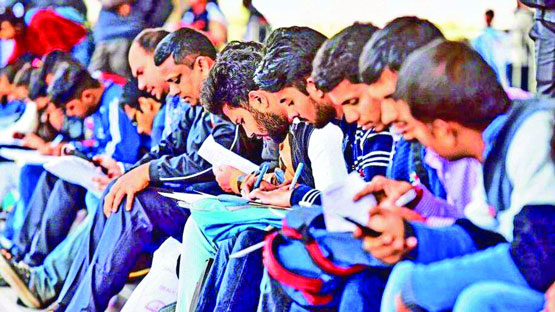Budget proposes to create employment
But not in reality
Mahfuja Mukul: Unemployment is one of the problems of the country’s economy which is in various crises. It is important to increase employment to reduce this unemployment. But the proposed 2024-25 budget has no direction to increase employment. In this regard, the finance minister’s budget speech had some words but no effective action, which disappointed the youth. Those concerned say that few things are very important to increase employment.
These are steps to increase investment, youth training initiatives, increased allocation of employment related ministries, access to capital for youth and ensuring work-oriented education system. But there is no clear direction for these in the budget. Economists say that it is important to take necessary steps in this regard.
The executive director of the private research institute Center for Policy Dialogue (CPD) Fahmida Khatun said in the post-Budget press conference that private sector investment is important for employment. At present, private investment in the country is 23.5 percent of the gross domestic product (GDP). It is extremely low. Besides, initiatives have to be taken to create employment through planned programs. Naturally, if GDP growth increases, employment will increase. But as per CPD, our GDP growth is not generating employment. As a result, some more steps should be taken including increasing foreign direct investment (FDI) to increase employment.
According to economists, macroeconomic stability of the country is shaken due to various crises. Currently, every indicator of the economy is bruised. These include high inflation, lack of revenue collection, crisis in expenditure management, distress in the banking sector, new growth in exports, negative imports, stagnant investment and foreign exchange crisis. In this situation, it is necessary to increase the purchasing power by increasing the employment of people. But in the case of various ministries involved in employment, the allocation in the budget is not sufficient. Among these are the Ministry of Industry and Labor and Employment. It was necessary to increase more allocation in these ministries. There are many ongoing projects in these ministries. There are many ongoing projects under these ministries. There is no initiative to complete the projects quickly.
In terms of employment, it is said in the budget speech of the finance minister, one of the promises of the government in the election manifesto of Awami League in 2024 was to create massive employment. The government is working towards this goal. In the case of foreign employment, it is said that remittances or remittances sent by expatriates are very important to increase reserves as well as reduce dependence on foreign loans. For this reason, the government has taken various initiatives to send skilled workers. In addition, Tk 500 crore have been allocated to give loans to expatriates returning abroad. In terms of allocation, the allocation to the Ministry of Labor and Employment is only 0.06 percent of the total budget and 0.31 percent to the Ministry of Industry. Also, although the allocation to the Ministry of Labor and Employment has increased slightly, it has decreased in the Ministry of Industry.
According to Fahmida Khatun, a large part of the population in the country is youth. Skill development of these youth is very important. Because youth unemployment is increasing. He said that the total unemployment rate of the country is 3.2 percent. But youth unemployment is 10.6 percent. That is, 80 percent of the total unemployed are young people. Training these youths for employment or self-reliance, raising the standard of education and providing them with easy access to capital. But there is no such initiative in the budget. Considering these things, I see the budget as conventional. Some technology and equipment purchases are mentioned in the operating budget. But it is important to increase the skills of the youth in these uses.
According to him, there is a strange similarity between education and unemployment. Education does not mean that they get jobs. Among the unemployed youth in the country, those who have spent more time in formal education are at the peak of unemployment. These educated youths remain unemployed for long periods while searching for jobs to combine with institutional studies. Unemployment is higher among young educated people who have spent 11 years or more in formal education. Among women who have spent more than 9 years in formal education, unemployment rates are also high. On the other hand, among those who have spent less than 7 years in formal education, unemployment is very low. They have entered into any kind of employment. This is the scary side.
According to International Labor Organization (ILO) guidelines, those who work at least one hour a week are said to be employed. According to BIDS data, the unemployment rate in the country is below 4 percent. But this is not the true unemployment picture of the country. Section 2(65) of the Labor Act 2006 states that a worker is a person who is directly employed in an establishment or industry by fulfilling the conditions of his employment. Basically, workers are divided into two categories.
These are informal (informal) such as shops, small businesses, agriculture etc. identified by BBS. And the formal sector is government offices-courts, large industrial establishments, service establishments, etc. Again, 87 percent of the total workers are in the informal sector. But unemployment is increasing in recent times. According to ILO data, unemployment is also increasing in other countries of the world.
This situation has been created due to various reasons including Corona. When asked, the former director general of development research institute BIDS, Mustafa K Mujeri told, “We have received manpower bonus.” This is the positive side. But the main thing is that manpower should be used. As a result, new employment is needed. He said, manpower should be made efficient. That is why it is important to have steps in the budget.
Rare Israeli airstrike in Beirut kills Hezbollah commander and more than a dozen others
International Desk: Israel launched a rare airstrike that killed a senior Hezbollah milita…








